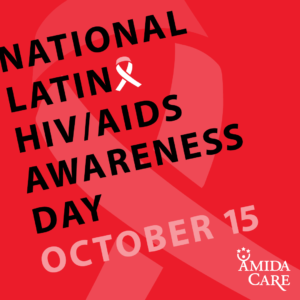National Latinx HIV/AIDS Awareness Day: The Importance of Education and Outreach

The HIV/AIDS epidemic has had a devastating impact on Latinx communities across the country, and it continues to be a threat. The most recent statistics from the Centers for Disease Control (CDC) show that adult and adolescent Latinx people accounted for over a quarter of new HIV diagnoses nationally. In New York City, the numbers are even higher, with Latinx people making up an estimated 35% of those living with HIV, and 36% of new diagnoses.
October 15, the last day of Latinx Heritage Month (Sept. 15-Oct. 15), is also National Latinx HIV/AIDS Awareness Day, a time to focus on the impact of HIV/AIDS on the Latinx population and promote HIV testing, prevention, and access to care. It’s fitting that we cap the celebration of Latinx contributions to American culture by working to ensure that this vibrant population stays healthy and thriving. Unfortunately, COVID-19 has also disproportionately affected Latinx communities in the U.S., including in New York City, making the goal of reducing HIV in Latinx communities even more urgent.
Gay and bisexual men are especially hard hit by HIV, comprising approximately 70% of new diagnoses in the U.S., and 29% of them are Latinx. In New York City, Latinx men are 2.2 times more likely than white males to have HIV. Latinx women are 7.4 times more likely to have HIV than white females. Latinx women of transgender experience are also greatly affected, with 26% of them estimated to be living with HIV.
There are several challenges to overcome, according to the CDC:
• 1 in 6 Hispanic/Latinx people with HIV are unaware they have it. Those who do not know they have HIV cannot begin crucial treatment and may unknowingly transmit HIV to others.
• Poverty, fear of disclosing immigration status, lower educational level, and language barriers may make it more difficult for some Latinx people to access HIV prevention services, testing and care. This can also result in higher rates of sexually transmitted infections (STIs).
• Stigma, fear, discrimination, and homophobia may impact the lives of some Latinx people, which can lead to care avoidance and put them at higher risk for HIV.
• Mistrust of the health care system can result in fewer clinic visits and lower use of and adherence to antiretroviral medications.
Due to these factors, education and outreach is especially important in the Latinx community, with community organizations such as Translatinx Network playing an important role. Amida Care continues to address health inequities, working closely with health leaders including Acacia Network and the Latino Commission on AIDS to ensure that people get access to the care and services they need to live full, healthier lives.
Resources
National Latinx AIDS Awareness Day
Latino Commission on AIDS
National Institutes of Health
Centers for Disease Control
